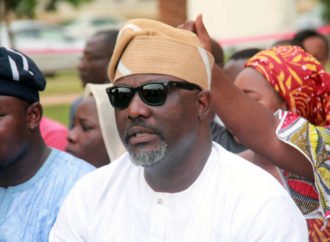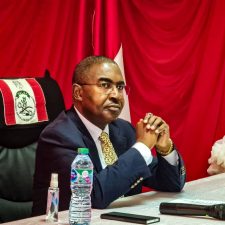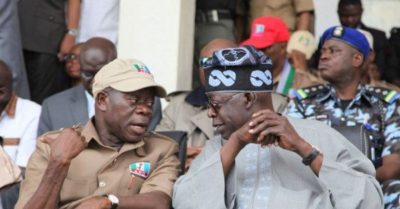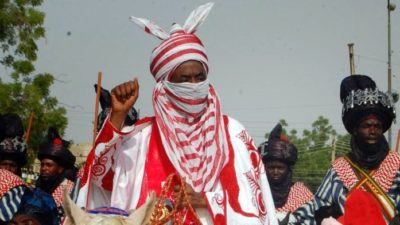*How we achieved 52.3% votes against Dino – Constituents
“For the past two years Sen. Dino Malaye has not organized one town hall meeting anywhere in Kogi West to meet with the people and present his scorecard or stewardship. He has been completely disconnected from the people since he won his election. He is no longer reachable, he has no constituency office in Kogi West as we speak , as a way to reach him on matters of interests from the people that elected him”, Olowo said. He said they were able to gather 52.3 percent of the needed votes adding that polling centres were setup where electorate came with voters’ cards to cast their ballot.
After weeks of denial by Senator Dino Melaye and later boast of impossibility of his recall by any body, it finally dawned on the nation’s Eight Senate most vocal member as the petition to recall him was submitted to the Independent National Electoral Commission (INEC) by his constituents of Kogi West Senatorial District.
The petitioners had gathered more than the 50.1 percent of signatures required to begin the process for recall.
Over 188,500 representing 52.3 percent of 360,000 registered voters in the district endorsed the petition.
Leaders of the movement to kick out Dino Melaye from the Senate submitted the petition at INEC headquarters, Abuja on Wednesday.
Coming under the umbrella of ‘Concerned Indigenes of Kogi West’, they presented six bags of documents containing the signatures of the electorate from six Local Government areas in the senatorial district.
These are Ijimu, Kabba/Bunu, Lokoja, Yagba West, Yagba East, and Mopa/Moro.
Chief Cornelius Olowo, the spokesperson for the group, told journalists that the move to recall Melaye was based on his poor performance since his election to the Senate 2015.
“Legislative performance is just on the floor, the quality of bills and motion that is presented on the floor by the level of interaction with the people you are representing.
“In the last two years some senators meet with their people quarterly. They update them on what has been happening and they also ask of their contributions and aspirations to be presented at the floor of the senate.
“For the past two years Sen. Dino Malaye has not organized one town hall meeting anywhere in Kogi West to meet with the people and present his scorecard or stewardship.
“He has been completely disconnected from the people since he won his election. He is no longer reachable, he has no constituency office in Kogi West as we speak , as a way to reach him on matters of interests from the people that elected him”, Olowo said.
He said they were able to gather 52.3 percent of the needed votes adding that polling centres were setup where electorate came with voters’ cards to cast their ballot.
He explained that it took one week for them to collate the results from the polls.
“We have over 360,000 registered voters in Kogi West. After about one week of collection of this signatures, as you know it takes time because it is more like election on its own. We are able to gather over 188,500 signatures who have endorsed the recall of the senator and we have submitted it at the office of INEC Chairman.’
It is now left for INEC to go and do confirmation of the signatures gathered before going on with the process needed for the recall, he said.
On the allegation that Governor Yahaya Bello was the sponsor of the recall and that people were already fighting over the disbursed money for the recall, Olowo said he was not aware and that the genuineness of the demand would be confirmed when INEC comes for confirmation of the signatories.
Contacted for comment, Chief Press Secretary to the Chairman, Rotimi Oyekanmi, said he was yet to obtain information on the matter.
INEC guidelines on recall
The process of recalling lawmakers as contained in ‘INEC guidelines for the recall of a member of the National Assembly or State House of Assembly’ are contained in Section 4 of the INEC Act 1998. The guidelines provide that on receipt of a petition for the recall of a national or state legislator, the Commission shall act within 90 days.
Within this period the Commission is expected to cross-check that the signatories appear on the authenticated Votes’ Register; and if satisfied, conduct a referendum.
The guidelines also provide that soon after receipt of the petition, Commission shall notify the member sought to be recalled, stating the facts of the receipt of the petition for the recall of the member and issue a public notice or announcement stating the days, time and location of cross-checking to be carried out at such centres as may be designated by the Commission within the constituency.
Also the guidelines provide that the Commission shall, if satisfied that more than one-half of the persons registered to vote in that member’s Constituency endorsed the petition, issue a public notice stating the days, time and location of referendum to be carried out at the same time throughout the Constituency and at such centres as may be designated by the Commission.
The guidelines states: “The power of control and supervision of a referendum for the recall of a member shall be vested in the Commission and any rules, regulations, circulars, manuals, directives and instructions given by the Commission regarding the referendum shall be binding.
How previous attempts failed
There have been three previous attempts made at recalling lawmakers in Nigeria so far which all ended in failure.
The first attempt which took place in 2000 involved the member representing Njikoka-2 State Constituency, Architect George Ike Okoye. Following a petition submitted to INEC, a referendum was said to have been conducted.
But there was a complaint by Okoye that those who signed the recall were different from those in the voters’ register.
He then went to Court and obtained an order restraining INEC from proceeding with the referendum. INEC, however, appealed the matter and got judgment in its favour to proceed with the referendum.
But the process was said to have failed at the referendum due to low turnout of registered voters who were expected to vote in favour of the recall.
The same fate befell the process of recalling Mr. Simon Lalong (then Speaker of the Plateau State Assembly and current Governor of Plateau State). He was then representing Shendam State Constituency.
Although INEC conducted a referendum, the recall process failed because they couldn’t get the 50 percent votes required.
Also in the case of Rep Farouk Adamu from Jigawa State, the process failed because the referendum conducted by INEC failed to meet the requirement.
Speaking on why the recall process has never succeeded in Nigeria, a former Director in charge of Legal at INEC, Ibrahim Bawa, said they failed largely due to the rigorous process of cross-checking and verifying information.
“All the previous attempts failed because of the process of verifying the signatories with the petitions signed. Also the Referendums couldn’t muster the 50 percent requirements”, Bawa said.
There was also the case of Umar Buba Jibril (PDP) representing Lokoja/Kogi/Koton Karfe Federal Constituency, who has been in the House of Representatives since 2007 when voters of his constituency submitted a recall petition to INEC. There was however a counter petition to the commission as some of the voters said their signatures were forged.
A suit in the state high court in Kogi dragged till the end of his first term tenure before he was re-elected in 2011 after defecting to the defunct Congress for Progressive Change (CPC).
He also won re-elections in 2015 for the third time after the merger of four parties that formed the APC.
Umar Buba Jibril representing Lokoja/Kogi/Koton Karfe Federal Constituency, who has been in the House of Representatives since 2007 under the PDP, had similar experience when voters of his constituency submitted a recall petition to INEC.
There was however a counter petition to the commission as some of the voters said their signatures were forged.
A suit in the state high court dragged till the end of his first tenure before he was re-elected in 2011 after defecting to the defunct Congress for Progressive Change (CPC). He also won re-elections in 2015 for the third time on the platform of the APC.
How Melaye’s will go
Dino Melay, however, continues to believe that his own case will end up like those of the old. But unfortunately, according to a lawyer, the court has no power to stop the recall process that has been instituted over him at this time. With the submission by Concerned Indigenes of Kogi West also telling about how the 52.3 percent recall process success was achieved, it is most unlikely that there will be low turnout when INEC eventually comes down for referendum. The DEFENDER reports.




